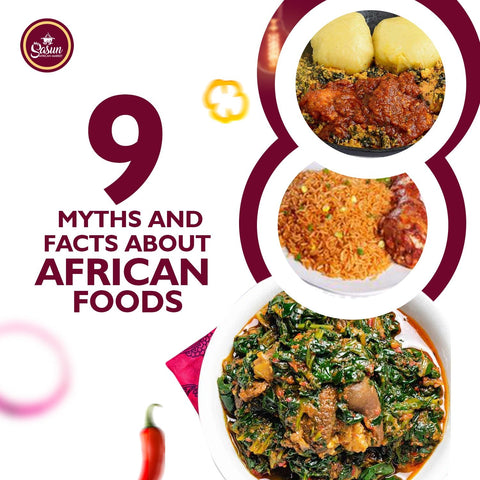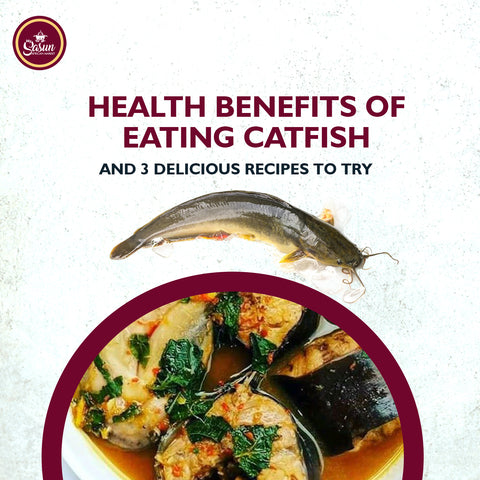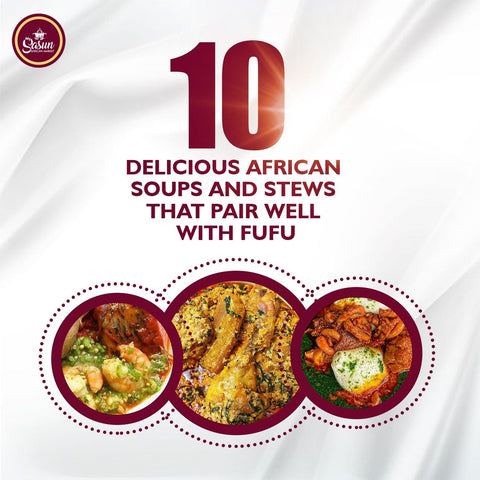African Foods are as diverse and rich as the continent itself. They offer a wide variety of flavors, ingredients, and cooking techniques from the north to the south, to the east, west and central parts of the continent. However, several myths and misconceptions about African foods persist. In this blog post, we will debunk some common myths and provide factual information to help you appreciate the beauty of the African food traditions.
Myth 1: African Food is Just Spicy

Fact: While some African dishes are known for their bold and spicy flavors, not all African cuisine is spicy. The continent's food landscape is vast and varied, with dishes ranging from mild and savory to hot and spicy. For instance, Moroccan cuisine is known for its aromatic spices like saffron and cinnamon, while Ethiopian cuisine features dishes like Doro Wat that can be quite spicy. However, there are many mild options, such as the popular West African dish Jollof rice, which can be made with minimal spice.
Myth 2: African Food is Unhealthy

Fact: How untrue! Compared to many parts of the world, African cuisine offers a plethora of healthy, nutritious options. Traditional African diets often emphasize whole foods, including fresh vegetables, fruits, whole grains, legumes, and lean proteins. Superfoods like moringa, baobab, and teff are packed with nutrients and are integral to many African diets. These foods offer numerous health benefits, from boosting immunity to providing essential vitamins and minerals.
Myth 3: African Cuisine Lacks Variety

Fact: Who came up with this fallacy? Oh, c’mon! Africa is home to over 50 countries, each with its own unique culinary traditions and ingredients. From the different corners of the vast continent, there are several unique foods. Nigeria alone has hundreds of foods to offer, talkless of the whole West Africa and then, the whole continents. Africa has tons of rice dishes, meat dishes, beans dishes, tuber dishes, fufu dishes, stews and soups, snacks and so on.
Myth 4: African Food is Hard to Find Outside Africa

Fact: This is so untrue! With the rise of African grocery stores and restaurants around the world, it's now easier than ever to find authentic African ingredients and dishes. Stores like My Sasun African Market offer a wide range of African products, from spices and grains to canned goods and fresh produce. Additionally, many African recipes use common ingredients that can be found in most supermarkets, making it convenient to recreate these dishes at home.
Myth 5: African Food is Only for Special Occasions

Fact: What does this even mean? That people from the vast continent of Africa only eat on special occasions? Or everyday is a special occasion for them? Oh, this is only what it is- a myth! While certain African dishes are reserved for special occasions and celebrations, I am delighted to let you know that Africans eat every single day. They have recipes that are simple and suitable for everyday meals. They have loads of breakfast recipes, lunch recipes and dinner as well. Contrary to what the mass media might have projected to you, Africans eat a lot and many cannot even survive months in ‘another man’s land’ without having to order for the staples and other ingredients from their motherland.
Myth 6: African Food is Monotonous

Fact: The misconception that African food lacks creativity and variety is far from the truth. Just because Tiktok highlighted one of Africa’s traditional meals- the fufu from West Africa does not mean that that is all there is to try in the continent. Each region in Africa boasts a unique culinary tradition. For example, the coastal regions of Africa have an abundance of seafood dishes, while the savannas are known for their hearty stews and grilled meats. The use of indigenous ingredients such as plantains, yams, cassava, and various types of greens adds to the richness and diversity of African foods.
Myth 7: African Food is Too Exotic and Unfamiliar

Fact: While some African dishes might use ingredients that are less familiar to Western palates, like dawadawa and other local spices, many African recipes use ingredients that are common worldwide. For example, tomatoes, onions, garlic, chicken, and rice are staples in many African dishes. The exotic flavors come from the unique combinations of these familiar ingredients with African spices and cooking techniques, creating a delightful culinary experience.
Myth 8: African Food is Too Difficult to Prepare

Fact: Many African recipes are straightforward and easy to prepare, often requiring simple ingredients and basic cooking techniques. For example, dishes like Ghanaian Kelewele (spicy fried plantains) or Nigerian Egusi Soup can be made with minimal effort and ingredients found in most kitchens. By following traditional recipes and using the right spices, anyone can recreate delicious African meals at home. But if compared to scooping cereals into a bowl of milk, African traditional meals aren’t easy for lazy arms, to be frank.
Myth 9: African Food is Only Eaten with Hands

Fact: While it is traditional in many African cultures to eat certain dishes with the hands, such as Fufu or Injera, this is not a continental practice. Utensils like spoons, forks, and knives are commonly used in various African countries, especially for dishes like rice, stews, and salads. The choice of eating utensils often depends on the specific dish and the cultural context. But, eating with hands is such a blessing, anyway. Many Africans home away from home would still wash their hands and settle down with their Fufu and soups. How natural can one be again? This is a great tradition that I hope the outside influences will never be able to snatch away from Africa. Amen.
Rounding Off:
With these few points of mine, I hope I have been able to convince you and not confuse you in anyway that African foods myths are just what theory are- myths and misconceptions! Visit My Sasun African Market to discover a wide array of authentic African ingredients and start enjoying rich African dishes today!







Comments (4)
Am here to let the whole world know that I was diagnose of herpes 3 years ago where all hope was lost and I had nothing to do about it,I just accepted the faith that one day I will cure of this disease and I just pray everyday for a helper and one day my sister introduce me to a herbal doctor man called Dr ahonsie that she saw him on internet well I contact him on his email,I was not fully convinced until he sent me the herbal medicine which he ask me to take for two weeks I took it with faith and i went for a retest in different hospitals and today am cured of this disease and am also using this medium to let all those having STD,like herpes and the rest not to give up,their is a man who can cure you,his name is Dr ahonsie . contact the great herbalist via his Email: drahonsie00@gmail.com / WhatsApp: +2348039482367. https://drahonsie002.wixsite.com/dr-ahonsie
I thought the physicians says there is no cure for HSV 2!!! I am telling you today that Dr ahonsie cure HSV 2 with his herbal medicine and once you get cured you are cured forever it is never reversible, I have been suffering for this deadly disease called h HSV 2 for more than a 2years and lost all hope because my doctor says there is no cure for HSV 2. Brethren I saw a testimony on the internet on how Dr ahonsie cure HSV, Hapatitis etc with his herbal medication and an email and watsapp to contact him was also displayed, I thought this was joke but I decided to contact him and he replied telling me not to worry that my problem is over . Dr ahonsie sent me a herbal medication to drink for one month but only 2weeks I feel strange and I went to my doctor and he confirmed me negative. He can help you too. Contact him drahonsie00@gmail.com or whatsapp +2348039482367 https://drahonsie002.wixsite.com/dr-ahonsie https://www.facebook.com/drstellaherbalhome?mibextid=ZbWKwL
My purpose out here today is to share this article to the world about how Doctor Odunga helped me in getting back my EX-boyfriend who broke up with me 4 months ago. I tried all I could to make him see reasons with me so that we can continue our relationship but he denied me. Thank God for giving me the thought of going into the internet for help, I searched properly and I saw different reviews of Doctor Odunga and I insisted on giving it a try by contacting him via what’s app on (+2348167159012). He gave me reason to live again and he prepared a spell and told me that my Ex-boyfriend will come back to me within 11 hours. Can you believe it, my EX-boyfriend came back to me, proposed to me and our wedding will be held soon. Contact him now!!! if you need any help. Email: odungaspelltemple@gmail.com and he does a lot of spells. Once again i want to say am very grateful for your help
Am really grateful and thankful for what Dr Ahonsie has done for me and my family. I Was having HERPES for good three years with no solution, the diseases almost took my life and because I was unable to work and I was also loosing lots of money .for medication, but one faithful day when I went online, I met lots of testimonies about this great man so I decided to give it a try and to God be the glory he did it. he cured me of my diseases and am so happy and so pleased to Write about him today. if you need his help or you also want to get cured just the way I got mine, just email him below drahonsie002@gmail.com You can also call or whatsApp his telephone number on +2348039482367. https://drahonsie002.wixsite.com/dr-ahonsie https://www.facebook.com/drstellaherbalhome?mibextid=ZbWKwLThanks once again Dr Ahonsie.